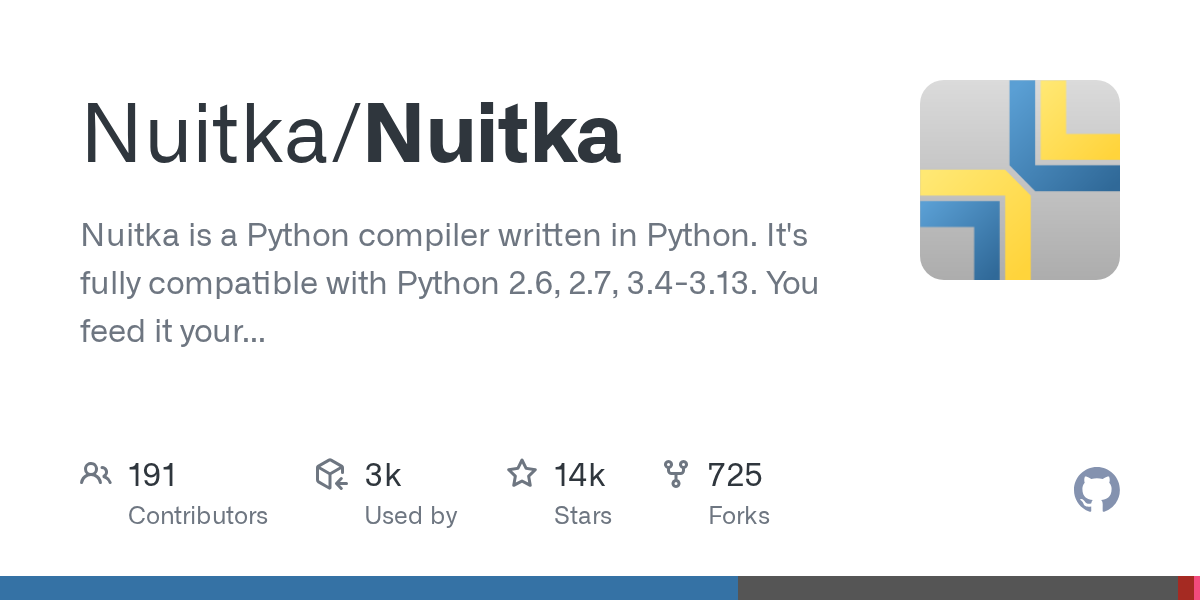Nuitka: Compiling Python to Executables and Extension Modules

Summary
Nuitka is a powerful Python compiler written in Python itself, offering full compatibility across a wide range of Python versions. It transforms Python applications into standalone executables or extension modules, significantly enhancing performance and simplifying distribution. This tool is ideal for developers looking to optimize their Python projects and create deployable binaries.
Repository Info
Tags
Click on any tag to explore related repositories
Introduction
Nuitka is a powerful Python compiler written in Python itself. It offers full compatibility with Python versions 2.6, 2.7, and 3.4 through 3.13. You can feed Nuitka your Python application, and it performs intelligent optimizations to produce a standalone executable or an extension module. This process significantly enhances performance and simplifies the distribution of your Python projects.
Installation
Installing Nuitka is straightforward and can be done using pip. Before you begin, ensure you have a compatible Python version installed.
To install Nuitka, open your terminal or command prompt and run:
python -m pip install nuitka
Nuitka requires a C compiler (e.g., MinGW64 on Windows, GCC on Linux, Clang on macOS). On Windows, Nuitka can automatically download and configure a suitable C compiler if one is not found. For more detailed installation instructions and platform-specific requirements, please refer to the official Nuitka documentation.
Examples
Let's walk through a simple "Hello World" example to demonstrate how to compile and run a Python script with Nuitka.
First, create a Python file named hello.py with the following content:
def talk(message):
return "Talk " + message
def main():
print(talk("Hello World"))
if __name__ == "__main__":
main()
To compile this script into an executable, use the following command:
python -m nuitka hello.py
Nuitka will process your script and generate an executable file (e.g., hello.exe on Windows, hello.bin on Linux/macOS) in the same directory.
You can then run the compiled program:
./hello.exe
(or ./hello.bin on Linux/macOS)
For distributing your application to other machines without a Python installation, Nuitka offers standalone and onefile modes:
- Standalone Mode: Creates a folder containing your executable and all necessary dependencies.
This will create apython -m nuitka --standalone hello.pyhello.distfolder. - Onefile Mode: Packages everything into a single executable file.
python -m nuitka --onefile hello.py
Why Use Nuitka?
Nuitka provides several compelling reasons for Python developers:
- Performance Boost: By translating Python code into C, Nuitka significantly reduces the overhead typically associated with interpreted Python, leading to faster execution times for your applications.
- Simplified Distribution: Create standalone executables or single-file binaries that can be distributed and run on target machines without requiring a Python interpreter installation, simplifying deployment.
- Extension Modules: Compile Python modules into C-level extension modules, allowing them to be integrated seamlessly into other Python or C/C++ projects, potentially improving performance for critical components.
- Broad Compatibility: Nuitka supports a wide array of Python versions and operating systems, ensuring your compiled applications can run across diverse environments.
- Advanced Features: Leverage features like Multidist for combining multiple programs into a single binary, integrate with GitHub Workflows for automated builds, add custom icons and splash screens, and generate detailed compilation reports for analysis.
Links
- Nuitka GitHub Repository: https://github.com/Nuitka/Nuitka
- Nuitka Download Page: https://nuitka.net/doc/download.html
- Nuitka-Action for GitHub Workflows: https://github.com/Nuitka/Nuitka-Action